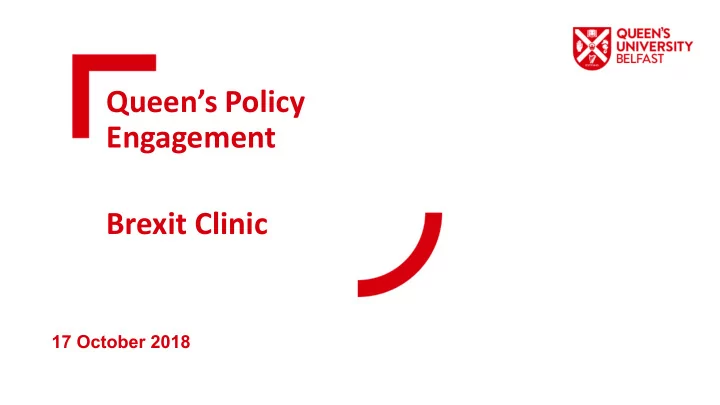

Queen’s Policy Engagement Brexit Clinic 17 October 2018
Queen’s Policy Engagement Brexit Clinic Prof. David Phinnemore (HAPP, @DPhinnemore)
Brexit – a timeline Withdrawal Withdrawal New and (Article 50) UK-EU Transition Negotiations Relationship 29 March 2019 29 March 2017 01 January 2021 onwards to to 31 December 2020 29 March 2019 (‘a new, deep and special ( status quo minus partnership’) institutions)
Avoiding a ‘no deal’ Brexit European Council 17-18 October Political + Declaration Withdrawal on Agreement Future UK-EU Relationship
Northern Ireland UK-Wide Backstop (‘all-weather’) (Time-Limited) Common Regulatory Area Customs Union Customs Union Common Regulatory Area (NI) Backstops Backstop to a Backstop ‘all-weather’ Northern Ireland Backstop plus (time-limited) UK-Wide Backstop
A deal … but no deal? Total S Seats 650 50 Available Votes 639 Absolute Majority 320 Conservatives + DUP 326 - DUP 10 - ERG 30-80 Total 286 Shortfall 34 Daily Telegraph , 16 October 2018
Queen’s Policy Engagement Brexit Clinic Dr Viviane Gravey (HAPP, @VGravey)
Wha hat ne next f for t the he e environment a after Br Brexit? https://www.brexitenvironment.co.uk/policy-briefs/
1. Common frameworks urgently required • Co-designed • Common principles & high level of environmental protection • Legislative frameworks a priori 2. Joint Ministerial Council in need of profound reform • Parity for devolved nations • Transparency • Dispute resolution mechanism 3. New watchdog needed – not one size fits all • 1+3 or 4+1 models 4. Environmental policy must be properly resourced • development, implementation and enforcement of existing policies.
1. NI as weaker environmental link – more at risk. 2. Flexibility required to deliver both continued level playing field within the UK & cooperation North/South on tackling shared environmental challenges. 3. Environmental ‘non regression’ principle 4. Changes to NI environmental governance: • Independent NIEA • Environment Commissioner as part of UK wide watchdog • Held accountable by NI Assembly & in absence of NI Assembly NIAC+ EAC in House of Commons
Conclusion ons • Quick fixes needed urgently – but we should not settle for them. • Profound changes to UK and NI institutions needed to make public policy making work across 4 nations after Brexit. • Need for domestic guarantees compounded by external uncertainties: No Deal catastrophic for the environment Draft Backstop not enough on environmental grounds
Queen’s Policy Engagement Brexit Clinic Dr. Mary Dobbs (Law, @mdobbs26)
Far armin ingin inNI NI? • Predominately small farms – c.4/5 = ‘very small’. • Tough farming conditions – ‘less favoured areas’ • Some dependency on seasonal workers (DAERA, 2018) • Most income via CAP (highly dependent) – Pillar 1 support = 83% of income over last 5 years. • Interdependent production with ROI – e.g. 25% of NI milk & 35% of NI lamb processed in ROI. • Export markets: mainly GB & then ROI (over £500m) (% varies with type).
Brex exit & A Agriculture? e? Depending on what happens*… the extremely overly simplified version: • Funding: • CAP • Standards: • EU environmental (and other) law • Access to resources and markets: • Free movement of goods • Free movement of workers • Impact of delays, certificates or tariffs? *Depends on future relationship and any trade deals…
So, wh what n next? • Dependent greatly on Brexit and negotiations with EU… • Industry can take some steps – become more self-sufficient/independent, investigate new options, ensure continue to comply with standards, etc… • But also domestic agricultural policy development. • Devolved competence, but overlaps with centralised issues and England effectively holds the purse-strings – so need to look to England within reason.
Future a e agricultural a approac oaches es? • English Agriculture Bill From NI perspective: • Enables DAERA to tweak current • Public money for public goods? approach, but not much more… Environmental… • Outcome focused. • Highlights some acceptable aims • Transitional period – 2027+ and indicates • Direct payments – gradually abolish undesirable/unacceptable • ‘Proportionate’ monitoring. approaches. Impact on English farming? • Centralises powers – impact on devolved funding policies. • Effective incentive to achieve aims? • Will it be viable for (small) farms?
Future a e agricultural a approac oaches es? • NI DAERA proposal – similar… but not identical: • Broader range for public money for public goods: • Increased productivity ; • Improved resilience; • Environmentally sustainable; and • An integrated, efficient, sustainable, competitive and responsive supply chain . • Also outcome focused. • Transitional period – 2 years +? • Direct payments – revise and quasi replace • Environmental regulation = backstop? Maybe keep cross-compliance… • Other components, e.g. co-design, insurance/economic resilience, innovation, education… • Cross-border issues? Context of limited NI powers, no Assembly/Executive and lack of control/certainty over funding.
Fundin ing: C : CAP, Bar arnett & & Gove • CAP: Pillars 1 & 2 – ring-fenced; • Barnett: Proportionate to English spending? • Gove: Independent review – devolved admin reps and chaired by Lord Paul Bew. • ‘In forming its recommendations, the review will look at what factors should influence the distribution of agricultural funding, while ensuring the effective use of public funds . Each country’s unique circumstances will be considered, including it environmental, agricultural and socio-economic make-up . Both the number of farms and the size of farms in each country could also be considered, to make sure that each part of the UK gets a fair deal…..’ • So?
Conclusion ons • Brexit will likely have serious negative consequences for NI agriculture, but steps can be taken to help the sector; • UK is main actor on international level, but NI can play important role – need viable agricultural policy: • English Bill should be reflected upon and responded to – especially re WTO components; • NI proposal needs developing and clarity; and • NI must feed into funding review in light of NI objectives and needs. • But DAERA can only do so much… need a functioning NI Assembly/Executive!
Queen’s Policy Engagement Brexit Clinic Prof Colin Harvey (Law, @BrexitLawNI)
Queen’s Policy Engagement Brexit Clinic 17 October 2018
Recommend
More recommend